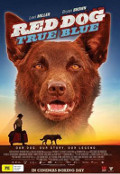
Directed by
Kriv Stenders
88 minutes
Rated PG
Reviewed by
Chris Thompson

Red Dog: True Blue
Synopsis: After taking his kids to see the film Red Dog, middle aged father, Michael Carter (Jason Isaacs) reveals to his son Theo (Zen McGrath) that when he was eleven and known as Mick (Levi Miller)he was the one who actually found Red Dog. He goes on to tell his son how he was deserted by his father and with his mother hospitalised, he was shipped off to his grandfather's (Bryan Brown) remote cattle station in the Pilbara region of Western Australia where he met a host of characters including helicopter pilot Stemple (Thomas Coquerel), station hands, Little John and Big John (Steve Le Marquand and Syd Brisbane), cook, Jimmy Umbrella (Kee Chan) and local Aboriginal family man Durack (Kelton Pell) and his son Taylor Pete (Calen Tassone). He also developed quite a crush on his live-in teacher Betty (Hanna Mangan Lawrence) and promptly found himself himself in competition with Stemple for her affections. It was after a big storm that Mick found a lost puppy who he called Blue (Phoenix) and so the adventure began.
I realise that it is tantamount to being un-Australian to say this, but I didn’t really warm to Stenders’ first crack at the family dog film, Red Dog (2011). For me it was clunky and clichéd and its lack of any real narrative left me adrift without anything but a collection of thinly drawn characters and hokey vignettes to hold onto (okay, deport me now!). So it was quite a surprise to me how much I liked this cleverly contextualised prequel. Yes, it’s a blatantly commercial affair, but so a film like this should be and, in those terms, it delivers a good yarn.
Perhaps it’s the fact that this one does have a narrative with which to frame its quirky characters and grab-bag of life-on-the-cattle-station stories. In fact, it has two narratives - the contemporary father-son story that bookends (and occasionally narrates) the main story of Mick and his relationship with his curmudgeonly grandfather and his devoted dog. In fact it’s Mick, not Blue (as Red is known in this film) that is the central story here and, for me at least, the boy is a stronger touchstone to carry me through the story than the dog is (again, feel free to serve me with deportation papers).
Miller, as the young Mick, takes a while to settle into the role but after a few awkward scenes finds his footing as an impressive young actor. Brown, at the other end of the scale, is right at home from the start in this kind of gruff but good-hearted role. It’s no stretch for him, but he’s very watchable just the same. The rest of the cast is a mix of new and familiar faces – Pell is solid as always, Marquand and Brisbane are quite funny together (and have a very subtle and deftly-handled denouement to their storyline) and even the ubiquitous Justine Clarke pops up as the mother in the contemporary story.
The screenplay is again written by Daniel Taplitz although this time it’s an original work (he adapted the screenplay for the first one from the book by Louis de Bernieres who curiously, this time around has written the novelisation of Taplitz’s screenplay). Geoffrey Hall returns to the team as cinematographer and again captures the Australian outback with a keen photographic eye for colour and texture, and prolific Australian composer, Cezary Skubiszewski also returns to provide a rather eclectic soundtrack that ranges from a gentle, melancholy piano theme to a rollicking duelling banjo’s piece that provides an excuse to insert mining magnate Lang Hancock (played by John Jarrett) into the story as a mate of Mick’s grandfather – they both seem to enjoy a beer and a banjo session together (I don’t know whether Hancock really played the banjo but, either way, it’s quite a fun scene). Skubiszewski’s strong soundtrack is augmented by some great old Aussie hits from Sherbet, Daddy Cool and The Ted Mulry Gang although the main track goes to the Travelling Wilburys.
It’s been five years between drinks for this dog’s tale and. in the interim, Koko, the star of Red Dog has left this mortal coil and been replaced by newcomer, Phoenix. That’s probably the only note of real sadness in True Blue and it’s only in the publicity material; not part of the on-screen story.
Despite my misgivings about Red Dog it did have that powerfully emotional (tear-jerking) ending which True Blue lacks. Still, whilst it may not be the best Australian film you’ll see this year and whilst it does little to address the debate on roles for women in the Australian film industry, it’s certainly an enjoyable outing made more so if, as I did, you see it with the family – and unfortunately, those opportunities to share a film that has something for all ages are today few and far between.

Want more about this film?


Want something different?




